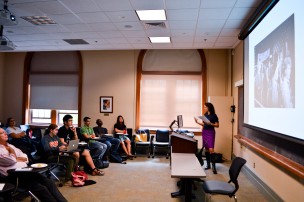German Studies Professor Sarah Wiliarty presents the second of four lectures for the 25th anniversary of the fall of the wall.
The Government Department hosted a lecture on Wednesday, Oct. 15 titled, “The Fall of the Wall: A Political Perspective.” The event featured Associate Professor of German Studies Sarah Wiliarty, who has been teaching at the University since 2002. Wiliarty specializes in Western European politics and will teach GOVT258: Losers of World War II in the spring.
Adjunct Associate Professor of German Studies Iris Bork-Goldfield introduced Wiliarty by outlining her accomplishments and speaking about the fall of the wall as a symbol of a reunited Germany.
In the lecture, Wiliarty focused on the years surrounding the destruction of the wall, the historical events surrounding the fall, the United States’ response to the division, and the legacy that the wall has left in Germany.
Wiliarty, who has lived in Bonn, Tübingen, and Berlin, began by explaining the background behind the country’s division in World War II as well as the Cold War’s contribution to the construction of the wall.
Wiliarty emphasized that the Berlin Wall remains significant in the current politics of Western Europe.
“One reason [to learn about the fall] is historically to understand the changes that happen in Europe and the fact that the world used to be so bipolar and it isn’t anymore,” Wiliarty said. “It’s a fundamental shift in how politics are regulated. The fall brought about significant political change, which was about regular people.”
During the lecture, Wiliarty presented a video of Ronald Reagan’s speech at the Berlin Wall. She used photos of the construction of the Wall, demonstrations in opposition, and maps of Germany as visual aids.
Wiliarty emphasized the uniqueness of the heroic reactions of German citizens who openly opposed the East German government by setting up a refugee camp on the border of Hungary and participating in demonstrations at the risk of being shot.
Jake Pitkow ’16 reflected on the historical importance of the fall of the Berlin Wall as well as its continuing importance.
“It’s a turning point in world history where the crushing yoke of oppression was finally dismantled in Eastern Europe or was beginning to be dismantled at a time of enormous fear,” Pitkow said. “Not to mention that the effects are still felt today.”
Victor Zhao ’17 emphasized that understanding the Berlin Wall is integral to contextualizing current events, even beyond the scope of Western Europe.
“I’m from China, and there’s something similar going on in Hong Kong right now [relating to oppression], so I’m especially interested in the legacy of the fall of the Wall,” Zhao said. “People always want rights like freedom and democracy, and the Wall was such a physical construction…. [The Wall symbolizes] that power for basic human rights.”
During the conclusion of her lecture, Wiliarty discussed the Wall’s lasting legacy both in Germany and abroad. This legacy includes the long-lasting impact the division of East and West Berlin had on the East Berlin economy; the chancellorship and a largely successful government in East Germany; and the rise of the communist party, which won a portion of the vote in the last election.
Pitkow stated that the lecture changed his understanding of the political relationship between Germany and the U.S.S.R. during the Cold War.
“What surprised me was the two amendments to the western constitution, which sort of informed how they were going to move forward,” Pitkow said. “I had always understood it to be that the communists had lost and were going to have to do what the Soviets wanted. I didn’t know that there were 300,000 troops in East Germany, and that informed their decisions about the constitution.”
Wiliarty emphasized that she hoped to use the Berlin Wall as an example of how a specific event in world history can shape the modern world.
“As we get further and further away from the Wall coming down, it’s important to remember how long and deep the division of Germany was,” Wiliarty said. “It’s easy to regard Germany as a single country without the division. Also, we don’t have to regard the world as static because real change can happen.”
Wiliarty’s lecture was the second in the German Studies Department’s series, “The Berlin Wall and its Fall,” which commemorates the 25th anniversary of the fall. The first lecture was held on Sept. 24 by Associate Professor of History Erik Grimmer-Solem, titled “From Great War to Great Wall: The Fall of the Berlin Wall in Historical Perspective.” In addition to four lectures, the commemorative series includes a creative contest for students. Three winning submissions of poetry, essays, cartoons, or collages will receive prizes of $50-$200.
The series will continue on Wednesday, Oct. 29 with NPR News Reporter Bellamy Pailthorp’s lecture on “The Fall of the Wall—An Eyewitness Perspective.”

1 Comment
L
“What surprised me was the two amendments to the western constitution, which sort of informed how they were going to move forward,” Pitkow said. “I had always understood it to be that the communists had lost and were going to have to do what the Soviets wanted. I didn’t know that there were 300,000 troops in East Germany, and that informed their decisions about the constitution.”
Good Lord, this came as a surprise? To a Wesleyan student?